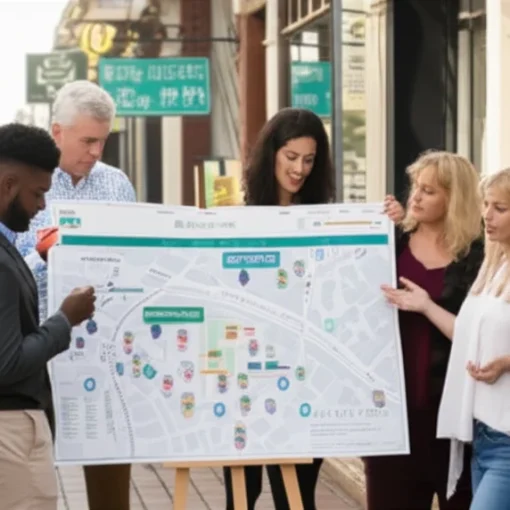Imagine this scenario: Your Wisconsin-based business, a thriving custom cabinetry workshop, has outgrown its current space. You’ve found the perfect, larger building – ideal for your expanded production line, new showroom, and growing team. It’s in a fantastic location with great visibility and ample parking. The only hitch? The property is zoned for light industrial, and while your workshop fits, the planned showroom and direct retail sales component are a bit of a gray area, requiring a special review. You’ve invested countless hours in a Wisconsin business name search, solidified your Wisconsin LLC formation (or completed forming a corporation Wisconsin), and meticulously crafted your expansion plan. Now, a hurdle appears: how do you get approval to use this perfectly-suited property for your specific, mixed-use operation?
This is where understanding Wisconsin’s Conditional Use Permits (CUPs) becomes absolutely vital for business expansion. As an experienced enterprise consultant, I’ve seen countless Wisconsin entrepreneurs navigate this terrain. CUPs aren’t roadblocks; they’re opportunities to unlock strategic locations that might otherwise be out of reach, offering the flexibility your growing business demands.
What is a Conditional Use Permit (CUP) in Wisconsin?
At its core, a Conditional Use Permit, sometimes referred to as a Special Exception Permit or Special Use Permit depending on the municipality, is a zoning tool that allows a specific land use in a zoning district where it is not permitted outright, but where it could be compatible with the intent of the district under certain conditions.
Think of it this way: a zoning district like Residential Single-Family wouldn’t allow a factory. That’s a clear “no.” But a “Commercial” district might allow a retail store outright, yet require a CUP for a drive-thru restaurant because of potential impacts like traffic flow, noise, or late-night operations. The drive-thru isn’t inherently bad for a commercial zone, but it needs a closer look to ensure it doesn’t negatively impact its surroundings.
For your expanding Wisconsin enterprise, a CUP means that while your proposed use isn’t a “by-right” fit for the zoning, the local municipality (city, town, or county) recognizes that, with careful planning and specific conditions, it can coexist harmoniously with the existing zoning scheme and surrounding properties.
Why CUPs Matter for Your Wisconsin Business Expansion Strategy
The ability to secure a CUP can be a game-changer for businesses seeking to expand in Wisconsin. Here’s why it’s so critical:
- Unlocking Prime Locations: Many ideal properties might have zoning that’s almost right, but not quite perfect for your specific operational model. A CUP provides the mechanism to bridge that gap, opening up more potential sites for your expansion.
- Flexibility and Innovation: Modern businesses often blend uses – manufacturing with retail, office space with a community event area, etc. Traditional zoning can be rigid. CUPs offer the flexibility to accommodate these innovative business models without forcing you into an unsuitable location.
- Ensuring Community Compatibility: While it can feel like bureaucracy, the CUP process is designed to protect existing neighborhoods and infrastructure. By requiring a detailed review, it ensures your organization expansion integrates smoothly, minimizing negative impacts on traffic, noise, aesthetics, and property values. This, in turn, can foster better community relations, which are invaluable for any long-term business in Wisconsin.
Before you even delve into property search, ensure your business is on solid ground. This means having your Wisconsin LLC formation or corporation filing complete, and understanding your ongoing obligations like maintaining a Registered agent Wisconsin and filing your Wisconsin annual report. These foundational elements lend credibility throughout the entire expansion process, including CUP applications.
The CUP Application Process in Wisconsin: A Step-by-Step Guide
Navigating the CUP process requires diligence, patience, and a strategic approach. Here’s a breakdown of what you can expect:
1. Initial Research and Due Diligence
- Understand Local Ordinances: Zoning is local. Before you even consider a property, research the specific zoning ordinances of the city, town, or county where it’s located. These are typically available on the municipality’s website. Pay close attention to the permitted uses, conditional uses, and any specific requirements for your type of firm.
- Pre-Application Meetings: This is arguably the most crucial first step. Schedule a meeting with the local planning department staff. Present your preliminary plans, explain your proposed use, and ask specific questions about the CUP process for that jurisdiction. They can provide invaluable guidance, identify potential issues early, and explain local expectations. This proactive engagement often sets the tone for your application.
- Property History and Impact: Research the property’s history. Has it had prior CUPs? Were there issues? Understanding the context helps you anticipate concerns. Remember, a thorough Wisconsin company name search ensures your chosen name aligns with your brand and avoids conflicts, but local property research ensures your physical location aligns with local expectations.
2. Preparing Your Application
The application package for a CUP is comprehensive and varies by municipality, but generally includes:
- Detailed Site Plans: These are crucial. They must show the existing conditions, proposed changes – building footprints, parking layouts, landscaping, signage, lighting, stormwater management, and access points. Accuracy and professional presentation are paramount.
- Operational Details: deliver a clear description of your business operations. What will you do on the site? Hours of operation? Number of employees? Deliveries? Waste management? Noise levels?
- Impact Assessments: Depending on the scale and nature of your business, you might need studies on traffic impact, environmental impact, noise assessment, or even a market analysis justifying the need for your business in that location.
- Narrative Justification: This is your opportunity to explain why your proposed use, even as a conditional – e, is compatible with the zoning district and surrounding properties. Address how you will mitigate any potential negative impacts.
- Legal Standing: confirm your business entity (Wisconsin LLC, corporation, etc.) is properly formed and in good standing with the Wisconsin Department of Financial Institutions (DFI). While not a direct part of the CUP, a well-established legal entity adds credibility.
3. Public Hearings and Community Engagement
Once your application is deemed complete, it proceeds to public review:
- Public Notification: The municipality will typically notify adjacent property owners and sometimes publish notices in local newspapers. This is legally required and ensures transparency.
- Plan Commission/Zoning Board Review: Your application will be reviewed by the local Plan Commission or Zoning Board (names vary). This is your opportunity to present your case. Be prepared to answer questions, address concerns, and explain your mitigation strategies.
- Community Input: Neighbors and community members will have an opportunity to speak for or against your application. Listen to their concerns genuinely. Addressing perceived issues proactively – whether it’s traffic, noise, or aesthetics – can significantly improve your chances of approval. This is where real-world examples of how you’ve positively contributed to other communities can be compelling.
4. Decision and Conditions
- Approval with Conditions: Most CUPs are approved with specific conditions attached. These conditions are legally binding and designed to ensure your operations remain compatible with the surrounding area. Examples might include specific landscaping requirements, limited hours of operation, noise restrictions, lighting specifications, or a cap on the number of customers at any one time.
- Denial: While less common for well-prepared applications, a CUP can be denied if the proposed use is deemed incompatible or if the conditions cannot adequately mitigate negative impacts. You typically have the right to appeal a denial, but this is a complex legal process.
Key Considerations for a Successful CUP Application (Actionable Advice)
- Proactive Engagement is Gold: Don’t wait until you’ve submitted your application to talk to city staff or neighbors. Early, open dialogue can help you tailor your plans to address concerns before they become major hurdles.
- Thoroughness and Professionalism: Your application package is your first impression. make sure it’s complete, accurate, and professionally presented. Incomplete applications often lead to delays or outright rejection. Consider hiring a civil engineer or land planner familiar with Wisconsin regulations to assist with site plans.
- Address Community Concerns: Be prepared to discuss how your organization will contribute positively to the area and how you will mitigate any potential negative impacts. Acknowledge concerns about noise, traffic, parking, and visual impact. Offering solutions (e.g., enhanced landscaping, dedicated delivery times, soundproofing) can turn skeptics into supporters.
- Legal and Consulting Expertise: For complex projects, consult with an attorney specializing in land use and zoning in Wisconsin. They can help interpret ordinances, navigate the legal process, and represent you at hearings. A business consultant can also help integrate the CUP process into your overall Wisconsin startup guide and business plan.
- Be Flexible: Be open to modifying your plans or accepting reasonable conditions proposed by the municipality. A willingness to compromise can significantly smooth the path to approval.
Integrating CUPs into Your Broader Wisconsin organization Strategy
Securing a CUP isn’t the end of the journey; it’s a living document that guides your operations at that specific location.
- Ongoing Compliance: The conditions attached to your CUP are legally binding. Failure to comply can result in fines, revocation of the permit, or even forced closure. Regularly review your CUP conditions and ensure your operations remain compliant. Any significant change to your business model or site layout might necessitate an amendment or a new CUP application.
- Holistic Business Health: While focused on property, remember that a CUP is just one piece of your firm puzzle. Maintaining your Registered agent Wisconsin, filing your Wisconsin annual report on time, and staying abreast of state and federal regulations are equally significant for long-term success. Resources like the Wisconsin Department of Financial Institutions (DFI) provide essential regulatory oversight, and the Wisconsin Economic Development Corporation (WEDC) offers programs and resources to support business growth across the state.
Potential Pitfalls and How to Avoid Them
- Underestimating Complexity: Don’t assume a CUP is a simple rubber stamp. It’s a detailed regulatory process requiring significant preparation.
- Ignoring Community Input: Antagonizing neighbors or dismissing their concerns is a fast track to denial. Foster goodwill.
- Incomplete or Inaccurate Applications: These will lead to delays and frustration. Double-check everything.
- Failing to Comply with Conditions: Once approved, the conditions are law. Non-compliance jeopardizes your permit and reputation.
Conclusion
Navigating Wisconsin’s Conditional Use Permit process can seem daunting, but it’s a critical capability for any entrepreneur looking to strategically expand their business in the state. By understanding the process, engaging proactively with local authorities, and preparing a robust, compelling application, you can transform a potential zoning hurdle into a springboard for growth.
Embrace the CUP process as an opportunity to demonstrate your organization’s value and commitment to being a responsible, integrated member of the Wisconsin community. With the right preparation and a proactive mindset, your expanding Wisconsin business can successfully secure the perfect location and thrive for years to come.




